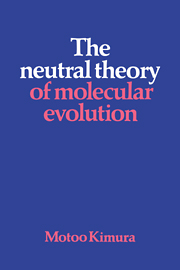Book contents
- Frontmatter
- Contents
- Preface
- Introduction
- 1 From Lamarck to population genetics
- 2 Overdevelopment of the synthetic theory and the proposal of the neutral theory
- 3 The neutral mutation-random drift hypothesis as an evolutionary paradigm
- 4 Molecular evolutionary rates contrasted with phenotypic evolutionary rates
- 5 Some features of molecular evolution
- 6 Definition, types and action of natural selection
- 7 Molecular structure, selective constraint and the rate of evolution
- 8 Population genetics at the molecular level
- 9 Maintenance of genetic variability at the molecular level
- 10 Summary and conclusion
- References
- Author Index
- Subject Index
- Frontmatter
- Contents
- Preface
- Introduction
- 1 From Lamarck to population genetics
- 2 Overdevelopment of the synthetic theory and the proposal of the neutral theory
- 3 The neutral mutation-random drift hypothesis as an evolutionary paradigm
- 4 Molecular evolutionary rates contrasted with phenotypic evolutionary rates
- 5 Some features of molecular evolution
- 6 Definition, types and action of natural selection
- 7 Molecular structure, selective constraint and the rate of evolution
- 8 Population genetics at the molecular level
- 9 Maintenance of genetic variability at the molecular level
- 10 Summary and conclusion
- References
- Author Index
- Subject Index
Summary
The neutral theory asserts that the great majority of evolutionary changes at the molecular level, as revealed by comparative studies of protein and DNA sequences, are caused not by Darwinian selection but by random drift of selectively neutral or nearly neutral mutants. The theory does not deny the role of natural selection in determining the course of adaptive evolution, but it assumes that only a minute fraction of DNA changes in evolution are adaptive in nature, while the great majority of phenotypically silent molecular substitutions exert no significant influence on survival and reproduction and drift randomly through the species.
The neutral theory also asserts that most of the intraspecific variability at the molecular level, such as is manifested by protein polymorphism, is essentially neutral, so that most polymorphic alleles are maintained in the species by mutational input and random extinction. In other words, the neutral theory regards protein and DNA polymorphisms as a transient phase of molecular evolution and rejects the notion that the majority of such polymorphisms are adaptive and maintained in the species by some form of balancing selection.
The word ‘neutral’ is not used in a strict, literal sense. The emphasis is not on neutrality per se, but on mutation and random drift as the main explanatory factors.
- Type
- Chapter
- Information
- The Neutral Theory of Molecular Evolution , pp. xi - xviPublisher: Cambridge University PressPrint publication year: 1983
- 1
- Cited by



